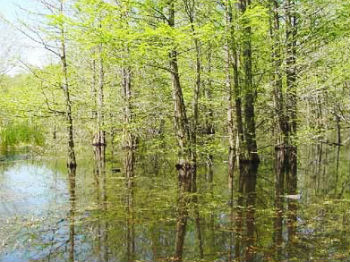A version of this story also appears in the Tideland News.
 The Hofmann forest has freshwater forested wetlands like Bladen Lake State Forest’s, above, in North Carolina. A report released earlier this year by the EPA found that states along the Atlantic coast have lost more than 200,000 acres of freshwater forested wetland since 2004. Photo source: Ducks Unlimited The Hofmann forest has freshwater forested wetlands like Bladen Lake State Forest’s, above, in North Carolina. A report released earlier this year by the EPA found that states along the Atlantic coast have lost more than 200,000 acres of freshwater forested wetland since 2004. Photo source: Ducks Unlimited |
MAYSVILLE – Extensive ditching in the Hofmann Forest in Onslow and Jones counties that drained about 6,500 acres of wetlands may have violated federal law by being dug without permits, the Army Corps of Engineers has concluded after a three-month investigation.
Supporter Spotlight
The Corps’ District in office in Wilmington included a description of the alleged violations in a letter it sent recently to the U.S. Environmental Protection Agency in Atlanta, explained Mickey Sugg of the Corps’ regulatory section in Wilmington. EPA will determine if the ditching violated the federal Clean Water Act and what the penalties might be.
Under Section 404 of the law, the Corps has the job of regulating most ditching and filling of wetlands. The law allows forestland owners to dig small ditches to allow trees to grow or to make it easier to harvest them. Major ditching that changes the water table and dries out the land to make it suitable for other uses isn’t allowed without a permit.
“It (the letter) basically says that after our investigation, we feel that some activity there does not meet the requirements for a minor drainage exemption (for forestry),” Sugg said Monday. “It says that we recognize that they (EPA) have the ultimate responsibility to make the decision on whether enforcement action should be taken.”
The letter states that about 6,500 acres of wetlands have been affected by ditches that were dug between 2010-2012.
Hofmann Forest is owned by N.C. State University and has been at the center of a year-long controversy surrounding its planned sale for $150 million to an Illinois-based agricultural group. The sale is supposed to close by June 30, but a coalition of environmentalists and foresters is fighting the sale, citing potential damage to the ecosystem if the forest is converted to agricultural, commercial or residential uses. It’s unclear whether the alleged ditching and possible penalties will affect the sale.
Supporter Spotlight
Todd Miller, the executive director of the N.C. Coastal Federation, is pleased that the regulatory agencies are finally paying attention. He instigated the Corps’ investigation late last year when he asked the Corps for permits relating to wetland draining in the Hofmann. Miller made the request after reading in an “investor prospectus” written by the new owners that more than 5,500 acres of forest had been cleared and could be converted to agricultural uses. Such a conversion would first require permits from the Corps.
New Email CampaignA version of this story appears in the Tideland News MAYSVILLE — Opponents of the sale of the Hofmann Forest are trying a new tactic in their fight: A campaign to pressure N.C. State University officials and trustees. Ron Sutherland of the Wildlands Network said last week that his organization and others, including the N.C. Sierra Club and Audubon North Carolina, plan to use their websites or Facebook pages to provide links that will enable sale opponents to directly email trustees and other university officials. Opponents also will encourage property owners along major roads in the area to post signs indicating their opposition, he said. The “Save Hofmann Forest” signs will also inform motorists how to link to the email effort. The goal of the campaign is to convince N.C. State officials that the $150 million sale, due to be completed by June 30, is not only bad for the environment, but bad for the school’s image. Sutherland said the idea for the email campaign to the school trustees and other leaders was based on the at least limited success of a previous campaign to send letters and emails to N.C. Attorney General Roy Cooper, whose office has been defending the university in the lawsuit that seeks to require the environmental assessment. That effort, Sutherland said, sent more than 4,000 messages to Cooper, who is expected to run for governor in 2016. Cooper’s office has said the attorney general is required to defend the university. “We know those (messages) at least got his (Cooper’s) attention,” Sutherland said. “So the thinking is, why not try to do the same thing with the trustees by getting the groups to put out an ‘action alert’ to their members. If we can fill their (trustees and other university leaders) inboxes with 4,000 or 5,000 messages, I think that would at least get their attention.” Brad Rich |
“The EPA has raised the alarm about unacceptable losses of forested wetlands in North Carolina,” he said, referring to a report released earlier this year that found that states along the Atlantic coast have lost more than 200,000 acres of freshwater forested wetlands, like those found in the Hofmann, since 2004. “It appears from what has happened in the Hofmann Forest that many of these losses result from a failure of federal agencies to enforce their own wetland safeguards.”
Davina Marracini, an EPA spokeswoman in Atlanta, said she could not comment on the timetable for the EPA investigation. Nor could she comment on the possible penalties or on whom they might be imposed. She cited agency policy that prohibits comments on an ongoing investigation.
 Todd Miller Todd Miller |
Ron Sutherland, a conservation scientist with the Durham-based Wildlands Network, has opposed the sale of the Hofmann and is a plaintiff in a lawsuit to require an environmental assessment before the sale can take place. He said Monday that the Corps’ letter “clearly shows how all of this is a gray area … and how uncertain it is in terms of the future use of Hofmann” by the buyer.
The letter, he added, “also is most likely indicative that N.C. State and the buyer will have their hands full trying to sort things out with the Corps and EPA.”
In addition, Sutherland said, the Corps’ finding begs the larger question of how wetlands determinations and laws might affect the rest of the forest and its use by any buyer.
 Ron Sutherland Ron Sutherland |
The Hofmann land was acquired in the 1930s for research and to provide income for N.C. State’s forestry program. The working research forest, basically a tree farm, is technically owned by the Natural Resources Foundation, a nonprofit organization that supports the school’s College of Natural Resources. The money from the sale would be placed in endowment funds, and income from investments would be used to benefit the college, university officials have said.
But the sprawling forest is habitat for a wide variety of plants and animals and acts as a sponge, soaking up stormwater that otherwise would flow into the headwaters and watersheds of three significant coastal rivers: the White Oak, New and Trent. It also serves as a link of sorts between other habitat and wetlands areas, including the Croatan National Forest in Carteret and Craven counties, wildlife and conservation areas at the Camp Lejeune in Onslow County and the 75,000 acres of the Holly Shelter Game Land, managed by the N.C. Wildlife Resources in Pender County.
Opponents don’t trust statements by the buyer, Hofmann Forest LLC, that it doesn’t plan to develop the property. The corporation has said it will continue farming timber and underwrite some of the costs by selling rights to the military to train over and in the forest. It also says it plans to continue to allow school forestry researchers to continue to work there.
That prospectus that caught Miller’s eye, however, outlines plans to develop a tract large enough for up to two million square feet of commercial space and more than 10,500 homes, including a golf community, and converting as much as 50,000 acres to farms. It also notes the potential for mineral excavation and gas exploration.
It’s still unclear whether penalties would be proposed before the sale occurs, and whether those penalties would have any bearing on the sale. NCSU and Hofmann officials thus far have said they are cooperating fully with the investigation and do not expect it to affect the sale.
Sugg has said that if the sale of the property occurs before enforcement actions are taken, it’s not entirely clear whether those actions would be against N.C. State and its foundation or against the new owner.
Meanwhile, the coalition’s lawsuit to require an environmental assessment before the sale can take place grinds on. Wake County Superior Court Judge Shannon R. Joseph, in a decision in December, granted a motion by the university foundation board to dismiss the lawsuit, but the plaintiffs have appealed. Sutherland said the plaintiffs are still waiting for the university’s legal response to the appeal. Once all parties respond to the appeal, a court date could be set, he said.







